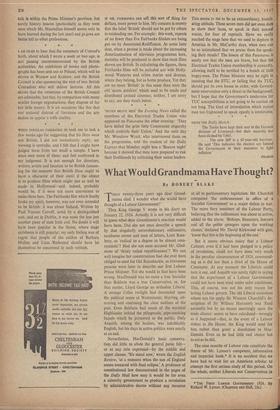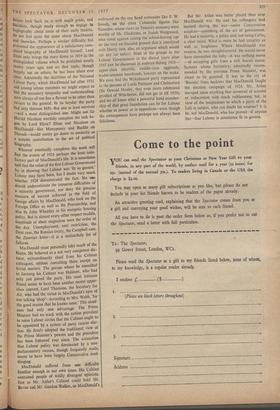What Would Grandmama Have Thought?
By ROBERT BLAKE "TODAY twenty-three years ago dear Grand- ." mama died. I wonder what she would have thought of a Labour Government !'
Thus King George V wrote in his diary on January 22, 1924. Actually it is not very difficult to guess what dear Grandmama's reaction would have been. Did she not once describe a speech by that singularly unrevolutionary millionaire, racehorse owner and man of letters, Lord Rose- bery, as 'radical to a degree to be almost com- munistic'? Had she not once accused Mr. Glad- stone of 'thinly veiled republicanism'? We can well imagine her consternation had she ever been obliged to send for Old Ramshackle, as irreverent persons were later to describe our first Labour Prime Minister. Yet she would in fact have been wrong. MacDonald was no more a true Socialist than Baldwin was a true Conservative, or, for that matter, Lloyd George an orthodox Liberal. A strange Celtic twilight had descended upon the political scene at Westminster, blurring, ob- scuring and confusing the clear outlines of the past. Even Baldwin had much of the mystical Highlander behind the phlegmatic, pipe-smoking facade which he presented to the public. Only Asquith, among the leaders, was indubitably English, but his days in active politics were nearly at an end.
Nevertheless, MacDonald's basic conserva- tism did little to abate the general panic felt— or at any rate expressed—by the middle and upper classes. 'We stand now,' wrote the English Review, 'at a moment when the sun of England seems menaced with final eclipse.' A professor of constitutional law demonstrated in the pages of the Daily Mail bow easy it would be for even a minority government to produce a revolution by administrative decree without any recourse at all to parliamentary legislation. Mr. Churchill compared 'the enthronement in office of a Socialist Government' to a major defeat in war. The 'more fiery members of the Labour Party, believing that the millennium was about to arrive, added to the alarm. 'Bishops, financiers, lawyers and all the polite spongers upon the working classes,' declared Mr. David Kirkwood with glee, 'know that this is the beginning of the end.'
But it seems obvious today that a Labour Cabinet, even if it had been pledged to a policy of revolution, could not have done very much in the peculiar circumstances of 1924, command- ing as it did less than a third of the House of Commons. At any moment the Liberals could turn it out, and Asquith was surely right in saying that the experiment of a Labour Government could not have been tried under safer conditions. This, of course, was not his only reason for letting Labour govern. The old Liberal statesman whose eye (to apply Sir Winston Churchill's de- scription of Sir William Harcourt) was 'fixed earnestly but by no means unerringly upon the main chance' seems to have calculated—wrongly as it happened—that, in the event of a Labour defeat in the House, the King would send for him rather than grant a dissolution to Mac- Donald. Even so he had little real choice but to act as he did.
The nine months of Labour rule constitute the theme of Mr. Lyman's competent, informative and impartial book.* It is no accident that we have had to wait for an American scholar to attempt the first serious study of this period. On the whole, neither Liberals nor Conservatives in * TIM FIRST LABOUR GOVERNMENT 1924. By Richard W. Lyman. (Chapman and Hall, 25s.) Britain look back on it with much pride, and Socialists, though ready enough to engage in hagiography about some of their early leaders,
do not feel quite the same about MacDonald and Snowden. Perhaps a similar difficulty has Prevented the appearance of a satisfactory com- pleted biography of MacDonald himself. Lord Elton only brings the story down to 1919 in the
distinguished volume which he published nearly !went)/ years ago, and on that topic, though happily not on others, he has been silent ever since. Admittedly the doctrines of the National Labour Party, which MacDonald led after 1931 and amongwhose members we might expect to find the necessary sympathy and understanding, were always of too fine a flavour to be other than Caviare to the general. In its heyday the party had only thirteen MPs. But one at least survives and a most distinguished one. Might not Sir Harold Nicolson worthily complete the task be- gun by Lord Elton? Elton and Nicolson on MacDonald—like Monypenny and Buckle on Disraeli—would surely go down to posterity as a notable contribution to the art of political biography, Whoever eventually completes the work will find the events of 1924 perhaps the least satis- factory part of MacDonald's life. It is sometimes said that the value of the first Labour Government lay in showing that Labour was 'fit to govern.' Labour may have been, but I doubt very much Whether 1924 demonstrated the fact. No owe should underestimate the immense difficulties of a minority government, nor deny the genuine measure of success achieved in the field of foreign affairs by MacDonald, who took on the Foreign Office as well as 'the Premiership, and also by John Wheatley in his energetic housing Policy. But in almost every other respect muddle, ineptitude or sheer stagnation were the order of the day. Unemployment, rent restriction, the Pent case, the Russian treaty, the Campbell case, the Zinoviev letter—it is a melancholy list of failures.
MacDonald must personally take much of the blame. He behaved as ,a not very competent dic- tator, extraordinarily aloof from his Cabinet colleagues, seldom consulting them except on trivial matters. The person whom he consulted in forming his Cabinet was Haldane, who had only just joined the party. His most intimate friend seems to have been another recent upper- class convert, Lord Thomson, the Secretary for Air, who had the virtue in MacDonald's eyes of not talking `shop'—according to Mrs. Webb, 'for the good reason that he knows none.' This aloof- ness had only one advantage. The Prime Minister had no truck with the notion prevalent in some Labour circles that the Cabinet ought to be appointed by a system of party caucus elec- tion. He firmly adopted the traditional view of the Prime Minister's powers and the precedent has been followed ever since. The accusation that Labour policy was dominated by a non- parliamentary caucus, though frequently made, seems• to have been largely Conservative mud- slinging.
MacDonald suffered from one difficulty familiar enough in our own times. His Cabinet contained people of wildly divergent opinions. Just as Mr. Attlee's Cabinet could hold Mr. Bevan and Mr. Gordon Walker, so MacDonald's embraced on the one hand extremists like F. W. Jowett, on the other Cobdenite figures like Snowden, whose views on Treasury economy were worthy of Mr. Gladstone, or Josiah Wedgwood, who voted against raising the school-leaving age on the very un-Socialist ground ,that it interfered with liberty (not, alas, an argument which would cut any ice today). Most of the groups in the Labour Governments in the dismal years after 1945 can be discerned in embryo during 1924— upper-class idealists, middle-class eggheads, trades-unionist boneheads, lawyers on the make. We even find the Wykehamist party represented in the persons of Lords Parmoor and Chelmsford (Sir Oswald Mosley, that even more celebrated product of Winchester, did not get in till 1929), and we all know what a powerful bond member- ship of that great foundation can be for Labour whether in power or in opposition—even though the consequences have perhaps not always been felicitous. But Mr. Attlee was better placed than ever MacDonald was. He and his colleagues had learned during the war—under Conservative auspices—something of the art of government. He had a majority, a policy and, not being Celtic, a clear mind. What is more he had integrity as well as toughness. Where MacDonald was evasive, he was straightforward. He would never have committed the folly—it was nothing worse —of accepting gifts from a rich biscuit manu- facturer whose baronetcy, admittedly recom- mended by the previous Prime Minister, was about to be gazetted. It was to the cry of `Biscuits' from hecklers that MacDonald fought the election campaign of 1924. Mr. Attlee stamped upon anything that savoured of scandal or indiscretion with much ruthlessness, but, in view of the temptations to which a party of the Left is subject, who can doubt his wisdom? It is he, not MacDonald, who has proved—if anyone has—that Labour is sometimes fit to govern.







































 Previous page
Previous page